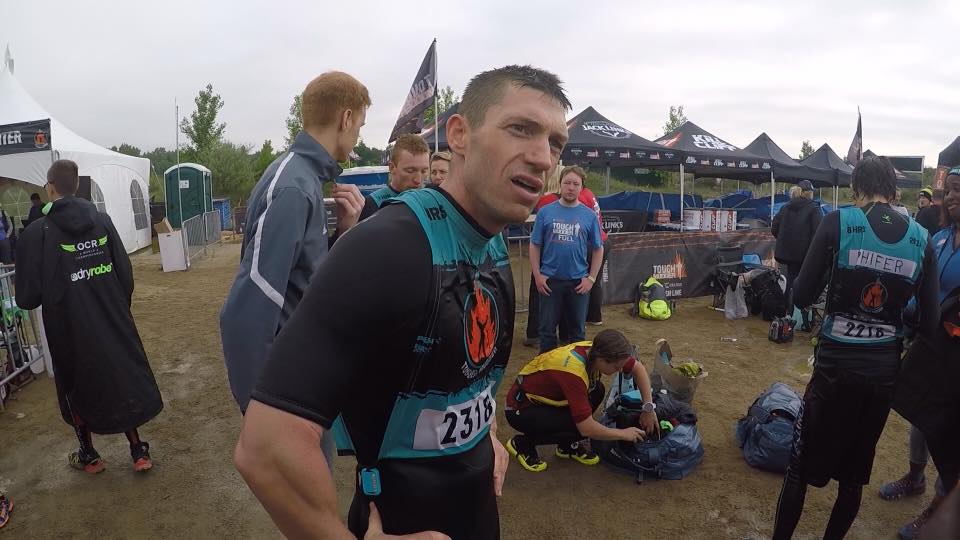The original title of this article was “Mental Stress and Time to Exhaustion” but I didn’t think that grabbed people’s attention enough. While I’m not suggesting you actually do nothing to prepare for Toughest Mudder (in fact I started I've spent the last couple of years collecting data through personal experience and talking to other athletes so I could write Mud Run Guide’s Ultra-OCR Bible), I am suggesting you should do nothing on the day of your Toughest Mudder event. Before I justify that statement, let’s back up and talk through the study I’m drawing my conclusions from which can be found in the book Endure by Alex Hutchison. The full experiment by Samuele M. Marcora can download here if you don’t like my synopsis below or want more information.
Kevin Thompson takes a moment to refuel while wearing his BleggMits
The Experiment:
Sixteen athletes were given a psychological test where one group of athletes was required to view a series of flashing letters for 90 minutes and click a specific button based off which letters appeared. Although not particularly challenging, it does require you to concentrate. The second group watched a series of bland documentaries for the same amount of time. Afterward, they performed a cycling test until exhaustion.
The Conclusion:
When they played the game beforehand, the subjects gave up 15% faster than when they relaxed watching the documentary beforehand. Despite exerting no physical energy, the participants performed worse in their cycling when their brains were tired from other non-physical tasks. Despite no physiological markers showing increased exhaustion, they performed worse and reported feeling more tired. This provides supporting data to the central governor model of exhaustion (i.e. your mind is what is primarily slowing you down, not physiological changes like a build-up of waste products) or a brain-centered theory of endurance.
How This Applies to OCR:
Whether you completely buy into the central governor model or not, we can still draw some lessons learned for OCR from this experiment (even with its small sample size), the main one being limit stress and outside work before an important race. While it isn't groundbreaking information to avoid physical activity beforehand, it may come as a surprise to many that you should avoid mental fatigue too. Specifically, that mental fatigue can result in a degraded physical performance despite having muscles that feel 100% ready for the race.
While I wrote this article heavily focused on Ultra-OCR (specifically Toughest Mudder). The lessons apply to all OCR. If you are looking to perform at your best you should try and avoid mentally tiring activities before your big race. This includes the week leading up to the race, but more importantly the day of the race. You can limit stress and mental exhaustion leading up to the race by doing things like:
-Giving yourself plenty of time to get to the race venue
-Ensuring you have directions to the venue and starting information well ahead of time
-If you are racing Toughest Mudder series or another Ultra-OCR, you want to limit your physical and mental activity the day of the race. Since Toughest Mudder occurs at night, for me, that means sleeping in, having breakfast and then relaxing most of the day. I also recommend trying to take a nap mid-day with the help of a supplement like Hammer Nutrition’s REM Caps (melatonin plus magnesium and 5-HTP). You want to avoid stuff like walking around all day (physically exhausting) or working on major projects for work/school (mentally exhausting).
Does this mean that you have to take it easy the day of the race? Well, if you want to reach as high as your personal potential will allow, science says that you should. However, there are lots of factors that go into training including lifetime experience, training, tapering/peaking, nutrition and more. For example, Zoe Chazen proved that you can still get away with doing well even after a mentally taxing day. At one of the Toughest Mudders, she took a final that morning, drove up to the race and still finished in the top five taking home some nice prize money.
With only two Toughest Mudders left in the US (but still plenty of other Ultra-OCR), you can apply these tips immediately if you are looking to reach a personal best. If you are looking for a good book to read I would pick up Endure by Alex Hutchison, which provides the science behind endurance. If you then want to take that science and apply it to Ultra-OCRs like Toughest Mudder or Spartan Ultra-Beast, you can pick up Mud Run Guide’s Ultra-OCR Bible.
Pictures provided by the athletes named in each photo.
